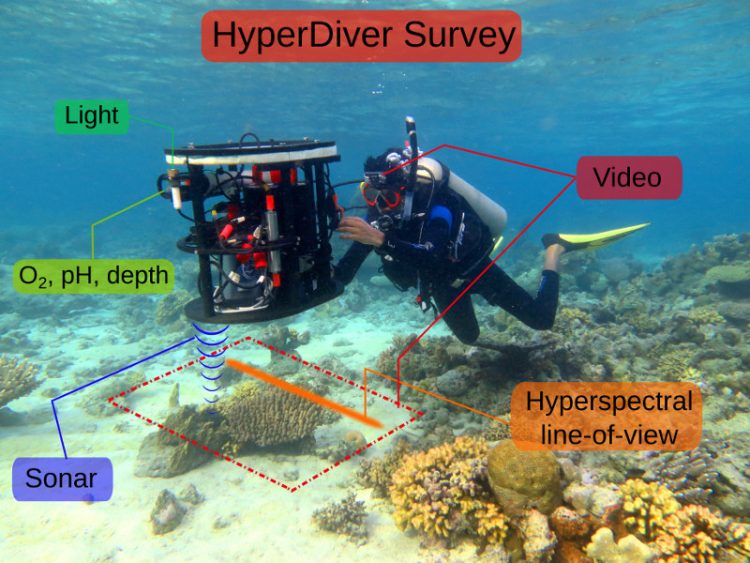Digitizing the coral reef: You can only protect what you know

With the HyperDiver system a diver can scan up to 40 square meters of the reef every minute. The spatial resolution is in the centimetre range. Max Planck Institute for Marine Microbiology
Coral reefs are complex ecosystems with high biodiversity
Due to the complexity and biodiversity of coral reefs, surveying them is generally a complicated and expensive process and only a fraction of the reef could be covered. Now the physicist Arjun Chennu and Marine Biologist Joost den Haan from the Max Planck Institute in Bremen, Germany present a novel approach, by which they create detailed maps of the underwater reef landscape.
Using novel camera technology and an intelligent computer algorithm, they demonstrate how a diver can survey the reef, analyze it and create a map of a large area of the reef in a comparatively short time.
Comprehensive reef mapping
The researchers from the Max Planck Institute in Bremen have now successfully tested the new HyperDiver system in Papua New Guinea. The test site was a coral reef near to natural seeps of carbon dioxide. In the vicinity of these seeps, the coral reefs show signs of stress and damage: a natural ecosystem laboratory for the HyperDiver system to study the effect of ocean acidification on coral reefs.
“The novel development is the collection of underwater spectral images and the analysis by a computer program with a self-learning algorithm,” explains Chennu. “We train the program to identify the reef organisms. This is similar to automated face recognition from video surveillance.”
His colleague Joost den Haan adds: “This technique allows us to create a visual map of the biodiversity of coral reefs. The more coral reefs we map, the better the system can distinguish the variety of coral species. Now it is possible to accurately detect the present condition of the reefs and to monitor any changes.” The researchers are very satisfied with their first results.
With the success of the pilot study, Chennu and den Haan hope that their system will soon be used worldwide towards the monitoring and protection of coral reefs. Here they present the HyperDiver technique in a short video (Youtube link https://youtu.be/v56hAf8SjYY)
For more information contact
Dr. Arjun Chennu
Phone: +49 421 2028 – 832, achennu(at)mpi-bremen.de
Dr. Joost den Haan
Phone: +49 421 2028 – 832, jhaan(at)mpi-bremen.de
Max Planck Institute for Marine Microbiology
www.mpi-bremen.de
Press contact
Dr. Manfred Schlösser
Phone: +49 421 2028 – 704, mschloes(at)mpi-bremen.de
Dr. Fanni Aspetsberger
Phone: +49 421 2028 – 645, faspetsb(at)mpi-bremen.de
https://youtu.be/v56hAf8SjYY youtube video
http://www.mpi-bremen.de Website of the Max Planck Institute for Marine Microbiology
Media Contact
All latest news from the category: Earth Sciences
Earth Sciences (also referred to as Geosciences), which deals with basic issues surrounding our planet, plays a vital role in the area of energy and raw materials supply.
Earth Sciences comprises subjects such as geology, geography, geological informatics, paleontology, mineralogy, petrography, crystallography, geophysics, geodesy, glaciology, cartography, photogrammetry, meteorology and seismology, early-warning systems, earthquake research and polar research.
Newest articles

Machine learning algorithm reveals long-theorized glass phase in crystal
Scientists have found evidence of an elusive, glassy phase of matter that emerges when a crystal’s perfect internal pattern is disrupted. X-ray technology and machine learning converge to shed light…

Mapping plant functional diversity from space
HKU ecologists revolutionize ecosystem monitoring with novel field-satellite integration. An international team of researchers, led by Professor Jin WU from the School of Biological Sciences at The University of Hong…

Inverters with constant full load capability
…enable an increase in the performance of electric drives. Overheating components significantly limit the performance of drivetrains in electric vehicles. Inverters in particular are subject to a high thermal load,…





















